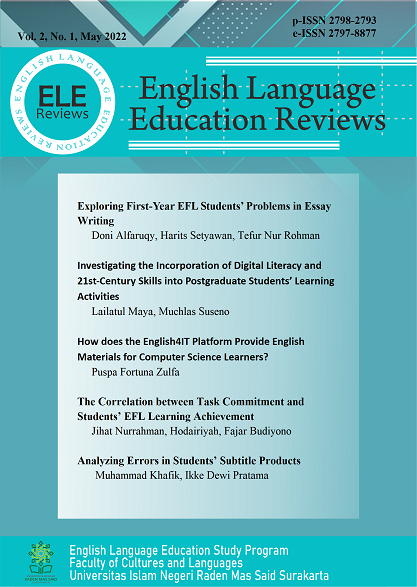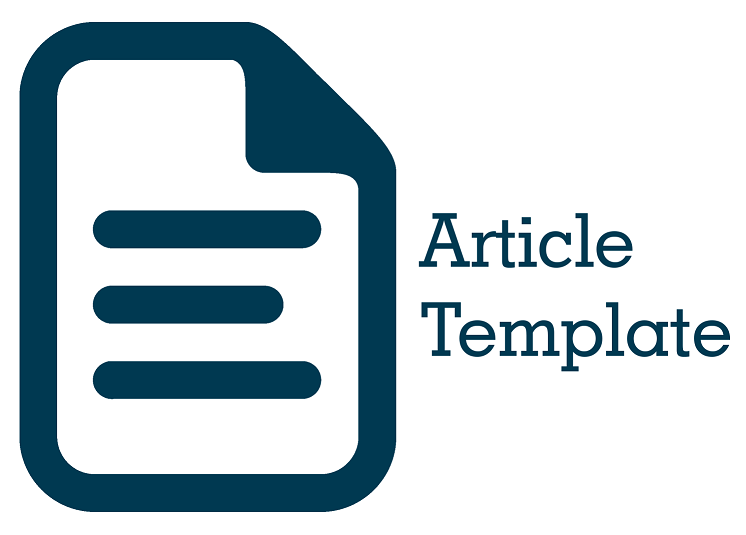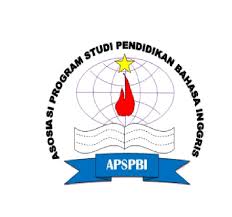The Correlation between Task Commitment and Students’ EFL Learning Achievement
DOI:
https://doi.org/10.22515/elereviews.v2i1.5039Keywords:
task, commitment, EFL, achievementAbstract
This research aims to prove whether there is a correlation between task commitment and students’ EFL Learning achievement on reading comprehension of the second-semester students of the Indonesian Language and Literature Education Study Program. This study used eleven questionnaire items of task commitment and learning achievement tests on giving and responding opinions. The sample of this research was 30 out of 165 students. Based on the calculation results using rser correlation, the correlation value of this study was 0.129. The correlation value was very low (almost uncorrelated) according to the interpretation table of the r value. A conclusion can be drawn that the task commitment, as one of the students’ internal factors, did not affect the students’ learning achievement.
Downloads
References
Barnett, E., & Casper, M. (2001). A definition of “social environment”. American Journal of Public Health, 91(3), 465a-465. https://doi.org/10.2105/ajph.91.3.465a
Djaali, H., Pudji, M., & Sudarmanto. (2008). Pengukuran dalam bidang pendidikan. Grasindo.
Human-Vogel, S., & Rabe, P. (2015). Measuring self-differentiation and academic commitment in university students: A case study of education and engineering students. South African Journal of Psychology, 45(1), 60-70. https://doi.org/10.1177/0081246314548808
Kiran N.C., & Murthy C. G. (2017). Academic task commitment among the students of Jawahar Navodaya Vidyalayas (JNVs) and Kendriya Vidyalayas (KVs). International Journal of Indian Psychology, 4(4). https://doi.org/10.25215/0404.051
Lusiana, N., Andriyani, R., & Miratu, M. (2018). Buku ajar metodologi penelitian kebidanan. Deepublish.
Muttaqin, S., & Chuang, H-H. (2022). Variables affecting English-medium instruction students’ achievement: Results of a multiple regression analysis. International Journal of Educational Research Open, 3. https://doi.org/10.1016/j.ijedro.2022.100152
Muwonge, C. M., Schiefele, U., Ssenyonga, J., & Kibedi, H. (2019). Modeling the relationship between motivational beliefs, cognitive learning strategies, and academic performance of teacher education students. South African Journal of Psychology, 49(1), 122-135. https://doi.org/10.1177/0081246318775547
Nordquist, R. (2020). English as a Foreign Language (EFL). Singapore Management University.
Renzulli, J. (2005). The three-ring conception of giftedness: A developmental model for promoting creative productivity. In R. J. Sternberg & J. E. Davidson (Eds.), Conceptions of giftedness (pp. 246-279). Cambridge University Press. https://doi.org/10.1017/CBO9780511610455.015
Slameto. (2015). Belajar dan faktor-faktor yang mempengaruhinya. Rineka Cipta.
Syarifa, A., Mustami’ah, D., & Sulistiani, W. (2011). Hubungan antara dukungan sosial orang tua dengan komitmen terhadap tugas (task commitment) pada siswa akselerasi tingkat SMA. Insan, 13(01), 1-11.
Twehues, A. (2013). Success and the balance of commitment and time: Effects of perceived time management control on college student performance. 130, 1-29.
Vayre, E., & Vonthron, A-M. (2019). Relational and psychological factors affecting exam participation and student achievement in online college courses. The Internet and Higher Education, 43. https://doi.org/10.1016/j.iheduc.2018.07.001
Vonkova, H., Jones, J., Moore, A., Altinkalp, I., & Selcuk, H. (2021). A review of recent research in EFL motivation: Research trends, emerging methodologies, and diversity of researched populations. System, 103. https://doi.org/10.1016/j.system.2021.102622
Wedel, K. (2021). Instruction time and student achievement: The moderating role of teacher qualifications. Economics of Education Review, 85. https://doi.org/10.1016/j.econedurev.2021.102183
Weed, Dr. M. (2017). The campus environment and its role in your college choice. https://www.huffpost.com/entry/the-campus-environment-and-its-role-in-your-college_b_58b62915e4b02f3f81e44dfe
Downloads
Published
How to Cite
Issue
Section
Citation Check
License
Copyright (c) 2022 Jihat Nurrahman, Hodairiyah, Fajar Budiyono

This work is licensed under a Creative Commons Attribution-NonCommercial 4.0 International License.
Authors retain copyright and grant the journal right of first publication with the work simultaneously licensed under a Creative Commons Attribution License that allows others to share the work with an acknowledgement of the work's authorship and initial publication in this journal.
This ejournal system and its contents are licensed under
a Creative Commons Attribution-NonCommercial 4.0 International License








